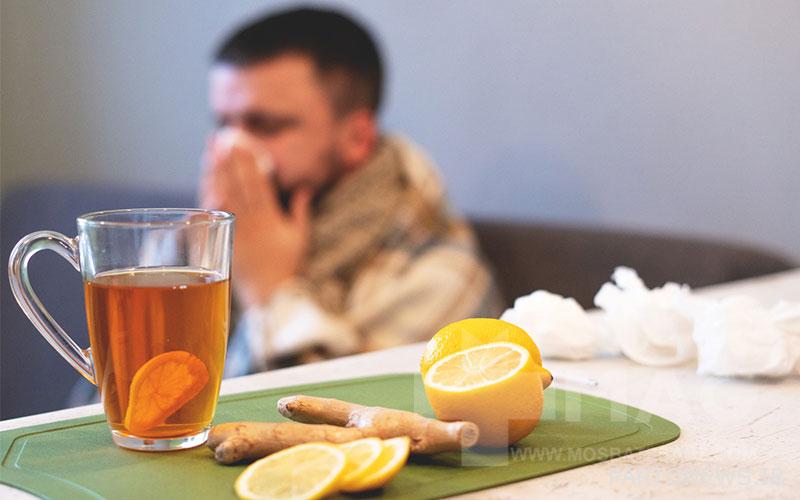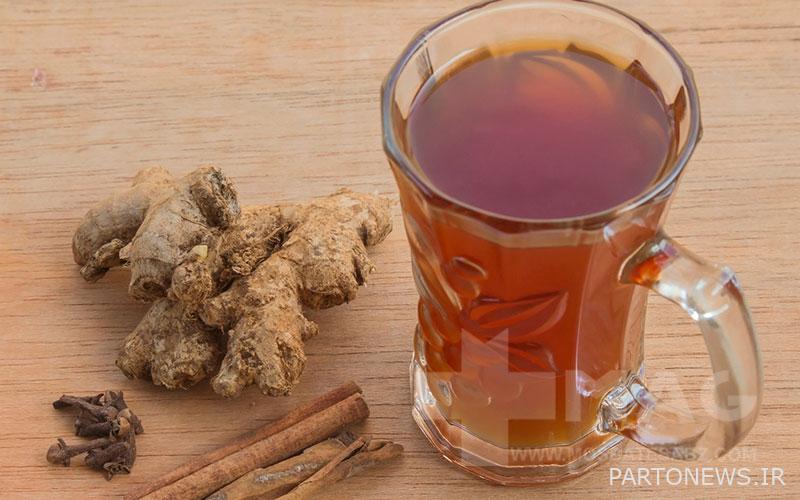Ginger for colds (unique properties of cinnamon and ginger for colds)

Colds are always lurking, especially in the cold seasons. It’s not always a good idea to jump straight to the use of strong antibiotics and chemicals at the first sign of a cold. If you use antibiotics arbitrarily, after a while they will lose their true effect and you will no longer get the results you expect from them. Sometimes the first step in dealing with a cold is to use herbal remedies, of which ginger is one of the best. Have you ever used cinnamon and ginger for a cold?
What we read in this article
Unique benefits of ginger for body health
Ginger is a flowering plant that is cultivated mostly in Southeast Asia and has many fans around the world as a spicy but tasty spice. Ginger can be used both fresh and dried. Also, today, ginger tablets are also available in pharmacies in the form of food supplements, and its wonderful properties can also be used in this way. The most important properties of ginger can be listed as follows:
- It has very strong anti-inflammatory and antioxidant properties
- Effective in relieving nausea
- Effective in weight loss
- Help to treat arthrosis
- blood sugar reducer
- Improving risk factors in heart diseases
- Help to treat chronic indigestion
- Significant reduction in menstrual pain
- Effective in reducing cholesterol levels in the body
- Effective in preventing cancer
- Improving brain function and preventing Alzheimer’s disease
- Fight against various infections
Properties of ginger from the perspective of traditional medicine
Before we examine the properties of ginger for colds, it is better to get to know more about the view of traditional medicine about this plant. The nature of ginger is hot and dry, and gingerols are one of the effective ingredients in it. The properties of ginger in the treatment of diseases have been discussed not only in Iran’s traditional medicine for many years, but also in China and India.
Ginger is usually prescribed in traditional medicine to improve colds, improve memory, relieve colic, treat headaches, improve arthritis and rheumatism, strengthen the stomach and relieve nausea. All these benefits together have caused ginger to be considered in modern medicine in today’s societies. How to use ginger to treat diseases can be in the form of tea, spice, etc.
Properties of ginger for colds
We do not suggest that you only use ginger for colds when you have cold symptoms. 100% in some cases, it is necessary to see a doctor and use his prescription drugs. But along with these drugs, you can take advantage of the benefits of ginger for colds to help recover as quickly as possible. But why is ginger good for colds and sore throats?
The amazing role of ginger in strengthening the immune system
Because of its very strong anti-inflammatory and antioxidant effects, ginger is effective in improving the health of the immune system. Acute inflammation is an important part of the body’s immune response that occurs naturally, but chronic inflammation damages the immune system and increases the likelihood of contracting many diseases.
Antioxidant-rich foods such as ginger can fight inflammation and keep the body’s immune system healthy against pathogens. Many laboratory and animal studies show that ginger can increase the body’s immune response and show significant antiviral and antibacterial properties.
The effect of ginger in the treatment of respiratory diseases
Ginger has long been one of the most widely used home remedies for colds and coughs. Ginger, having the mentioned anti-inflammatory property, helps to remove toxins from the respiratory system and causes bronchial dilation in asthmatic patients. Since diseases such as cold, flu and corona target the respiratory system, especially the lungs, it is possible that ginger can be effective in improving these viral diseases.
Antiviral properties of ginger
Part of the effectiveness of ginger for colds is related to the antiviral properties of this plant. As you must know, the causative agent of cold, flu and corona is also a type of virus. In some studies, it has been determined that ginger against Respiratory syncytial virus It works in humans and improves respiratory infections by increasing the immune response. Ginger contains vitamin C, B vitamins, iron, calcium and phosphorus, and being rich in nutrients and antiviral properties, it can be a remedy for respiratory diseases.

Prevent blood clots using ginger plant
The cause of some deaths caused by severe colds, flu and corona is the formation of blood clots in the main arteries and veins of the body. Blood clotting can be prevented with the help of some blood thinners. For this purpose, it may be possible to get help from the ginger plant, which is considered a natural blood thinner and having a chemical substance called salicylate can also be effective in preventing heart attacks.
Why is ginger good for colds and sore throats?
If you are looking for a scientific answer to the question of whether ginger is good for a cold or not? We have to say that so far no study has definitively proven that ginger is good for colds. But many researches show that ginger can be effective in preventing and treating colds.
Ginger relieves sore throat and reduces inflammation in the respiratory system, nose and throat.
The reason for the effectiveness of ginger for colds is summarized in the following cases:
- Ginger has antibacterial properties and works even better than some antibiotics to treat bacterial throat infections.
- Ginger has anti-viral properties and helps reduce fever and relieve pain. Try using fresh ginger to help heal respiratory infections.
- Ginger has anti-inflammatory properties and can improve inflammation in the back of the throat in diseases such as colds.
- Ginger is a strong antioxidant and prevents cell damage caused by inflammation.
Is ginger good for fever?
Yes; Ginger is great for reducing fever. Antibacterial properties of ginger make it lower the fever and reduce other cold symptoms. But do not forget that if the fever is very high, drugs such as acetaminophen must be used to relieve it, and herbal drugs alone cannot be enough. Be sure to use the benefits of ginger to relieve low fevers.
Ginger for colds and coughs
As we mentioned, ginger has anti-inflammatory properties. So when you have a sore throat and you cough, by reducing the inflammation, it can reduce the sore throat and reduce coughing. Ginger is usually used in the best antiviral herbal teas.
Most coughs caused by sore throats are caused by viruses. Medicines prescribed to treat colds cannot kill viruses. But research shows that ginger can strengthen the human immune system so much that it acts against the virus and improves symptoms such as sore throat and cough.
Ginger is the best medicine for sore throat
We said that cinnamon and ginger can be one of the best herbal remedies for colds. To make a strong potion with these two special ingredients, follow the steps below:
- Pour a glass of milk into the boiling milk.
- Add 2 tablespoons of honey to it.
- Add a little ginger and cinnamon powder.
- Put the boiling milk on the gas and let it heat up with a gentle heat.
- Stir it regularly until it reaches the boiling point, then turn off the flame and use the potion after it cools down a bit.
How to use ginger for colds
How can ginger be used for colds and sore throats? The medicinal and anti-inflammatory properties of ginger help reduce throat infections. Use ginger for colds in this way:
- Add freshly grated ginger to hot water and add a little lemon to it.
- Put a piece of fresh ginger in your mouth and chew it.
- Add fresh ginger to your juices and smoothies.
Also, nowadays, you can easily get ginger tablets by going to pharmacies or buying from online pharmacies. Another way is to use cinnamon and ginger tea for colds:

Cinnamon and ginger tea for colds
To prepare ginger and cinnamon tea, you need the following ingredients:
- 1 teaspoon of grated ginger
- ½ teaspoon of ground cinnamon
- 1 cup of water
The preparation is as follows:
- Pour water into a small teapot and heat until it boils.
- Add ginger and cinnamon to boiling water and let it boil for 10 minutes on low heat.
- Pass the tea through a strainer and drink.
After the prepared tea cools down a little, you can add some honey or lemon juice to it. Use this tea 2 to 3 times a day when you have a cold.
Disadvantages of ginger for colds
There are no side effects of using cinnamon and ginger for colds; Of course, if you are not allergic to these two plants. But consuming too much ginger in the long term can cause these problems:
- Heartburn: Excessive consumption of ginger increases the production of stomach acid and may be associated with symptoms such as heartburn, nausea and vomiting.
- Diarrhea: Ginger has laxative properties and excessive consumption can lead to diarrhea.
- Bleeding: Excessive consumption of ginger can thin the blood and increase the risk of bleeding.
Final speech about ginger for colds
The properties of ginger for colds are unique: it reduces fever, relieves sore throat and acts as an antitussive. This plant has anti-inflammatory, antioxidant, antiviral and antibacterial properties and improves respiratory problems. You can even use ginger to prevent colds. You can order ginger pills right now from the online pharmacy of Positive Green.

